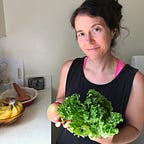White Vegans, We Must Do Better
I am a white vegan, and I can do better.
People who identify as “vegan” do so for a variety of reasons. Some vegans focus solely on health, some especially highlight environmental or animal welfare reasons. But in my experience, most vegans describe a combination of rationales for choosing a vegan lifestyle.
I identify as what is known in the community as an ethical vegan. This means that, while the purpose of my own veganism is certainly multifaceted, for me, the overarching focus is definitively on reducing suffering. This certainly speaks to the welfare of animals, but I also feel that veganism is important to reduce health-related suffering and our long-term environmental distress. Generally, it’s about active compassion and speaking out against injustice. And so, to me, ethical veganism means advocating for the liberation of both non-human animals and our fellow humans who are experiencing oppression.
In the vegan world, we as a group have largely not been great about speaking as directly about human rights as we do about animal rights. And this is a missing piece in our push for compassion that cannot continue to go unacknowledged. We care deeply about reducing the suffering of animals because we know we cannot stay silent when sentient beings are being brutalized — that must translate to the human experience as well, or we are not truly abiding by the values to which we cling.
In recent days, I have seen people within the vegan community taking advantage of the civil unrest to promote the animal rights movement. Instead of using the platform to ensure the focus is on racial injustice and oppression of our fellow humans, there are those who have attempted to reframe the Black Lives Matter ideals in order to ask that the public acknowledge that animal lives matter, too. This is severely tone deaf and has been incredibly disheartening to witness within my community — it cannot continue.
Black people, Indigenous people, and People of Color experience oppression every day in ways that I, as a white person, will never understand. And so I must keep listening, learning, and showing up. As a vegan whose life’s work it is to advocate for justice and compassion, it is my responsibility — and particularly as a white vegan — to stand with BIPOC in solidarity and with intentionality against racial injustice. And my ongoing fight against brutality means that I stand with the Black community (now and always) to demand that the police and our governments — and all of us — are held accountable.
I do not always get this right. I have had moments where I feel so overwhelmed by the plight of animals that, with all of my privilege, I wonder if that is all I have to give. And while boundaries and self-care are important, it is crucial to our work as vegan advocates for justice that we make sure our energy is spent on acting against oppression wherever it is. Suffering at the hands of another does not only occur on the farms and in the slaughterhouses. Systemic oppression occurs on our streets, in our schools, in our homes, in our businesses, in our governments; and as voices of compassion, we must speak against that brutality — and the silencing of it — as well. If we are not acknowledging our privilege and using it to fight for our fellow humans, how can we begin to think that we are advocating for justice at all?
To be clear, I certainly cannot speak for every vegan. I can only speak to my personal observations of the community at large and specifically my experience as a white person in this community. And I know that we can do better — that I can do better. If we choose to be on the front line, put ourselves at risk, speak out even if we know we’ll be met with dissent, all for the purpose of fighting against animal suffering, then we should just as easily be the first to advocate for our fellow humans who are suffering. And this means that we must continue to stand with the Black community long after this moment. When this movement continues forward but many of us have the opportunity (privilege) to return to “normal,” we must fight against the urge to take that turn back to complacency.
We must do the work, do the learning, take the actions — we can donate, write letters, call our government officials, educate ourselves about the sourcing of the products we buy, refuse to invest our dollars or our time in companies that exploit. We can have hard conversations and we can challenge the racism in ourselves and when we see it in others. As vegans, these are so many of the things we already do for the benefit of animals. And as white vegans, we must also use our platform of compassionate justice — and our privilege — to listen, to learn, and to uplift the human voices demanding change in the face of oppression.
As an ethical vegan, that is exactly what I am called to do.
Originally published at https://www.kindlivinghealth.com on June 4, 2020.
